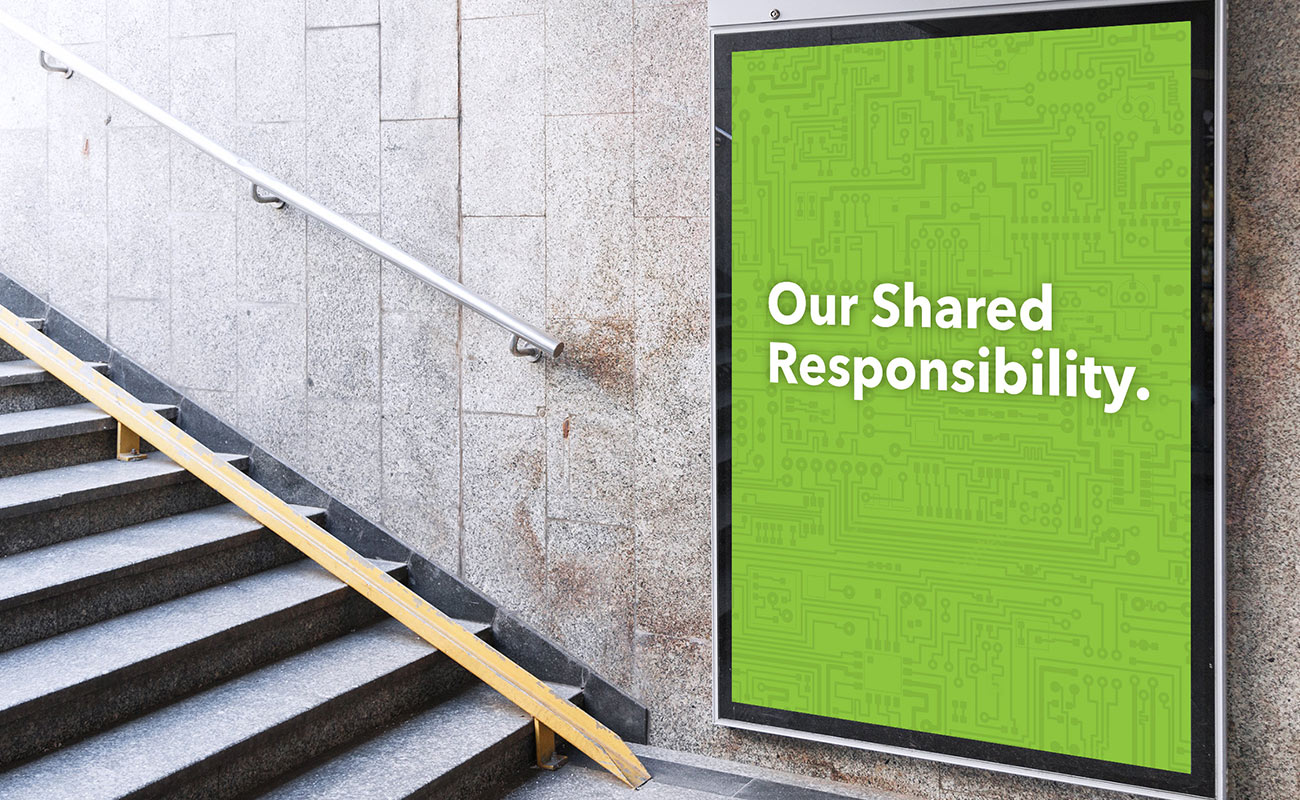It’s that time of year again. Every October is dedicated as National Cyber Security Awareness Month. The purpose of this initiative to engage and educate people, organizations, and businesses in our country about the impact cyber security has in their day to day lives. We have to realize that everyone plays a part to help protect our nation against cyber security threats using the “Our Shared Responsibility” theme. Curricula is a designated Champion so follow us and #CyberAware on social media to get cyber security tips that can help educate your team during this very important initiative.
What is National Cyber Security Awareness Month?
People are the most important part of your organization. Supporting your people is one of the greatest initiatives you can do to help build your organization’s culture. Use this month’s activities to focus on your people and help build a cyber security culture within your organization. Start with executive support or what is referred to as tone at the top. Engage your executives and make them fully embrace this month’s purpose. If we continue to promote cyber security awareness in our organizations, businesses, and educational institutions we can all help make a difference.
Cyber Security Awareness Month Schedule
Curricula is always busy during October. Our team travels the entire month of October, showing our support and enthusiasm behind our Nation’s National Cyber Security Awareness Month initiative. Follow the weekly themes identified for Cyber Security Awareness Month to help educate your organization about cyber security. Remember this is an ongoing effort and to use this month to give your security awareness program a boosted focus.
Oct. 3rd-7th
The Basic Steps to Online Safety and Security
Staying safer and more secure online starts with STOP. THINK. CONNECT. – the simple, actionable advice anyone can follow. STOP: make sure security measures are in place. THINK: about the consequences of your actions and behaviors online. CONNECT: and enjoy the Internet.
Whether banking, shopping, social networking, tracking our health or downloading the latest app, in today’s interconnected world, practicing good cybersecurity is critical. All digital citizens must learn to stay safer and more secure in their ever-expanding digital lives, including by preventing and responding to identity theft and scams, ensuring that home networks are secure, managing the security of mobile devices and teaching children to use the Internet safely, securely and responsibly. Week 1 shares simple ways we can protect ourselves and communities along with actions to take if impacted by a breach, cybercrime or other online issue. It will also examine the outlook for cybersecurity jobs and how to engage young people in pursuing careers devoted to protecting the Internet.
What to do?Take some time to talk with your organization about their online safety. Not only is this important for your organization, but you can connect to your people on a personal level. Almost everyone has some time of online identity at this point. Talk about the reasons why hackers could target them, how to protect their online accounts, and promote others to share their stories that have personally impacted them with the rest of your organization.
Oct. 10th-14th
Creating a Culture of Cybersecurity in the Workplace
All organizations – from large and small businesses to healthcare providers, academic institutions, government agencies and civil society – can experience data breaches or be targets of cybercrime, which can result in stolen intellectual property, theft of personal information or – if our critical infrastructure is attacked – a disruption to our way of life. Week 2 will focus on creating a culture of cybersecurity in the workplace through efforts like employee education, training and awareness and by emphasizing risk management, resistance and resilience. Promoting an educated workforce and following best practices – with an emphasis on skill- and career-building for existing personnel and potential new entrants into the cybersecurity workforce – will also be highlighted.
What to do?Creating a cyber security culture is not something that will happen in a month. Use this week to listen to share stories in your organization that could impact not only the business, but the personal lives of your employees. Security Awareness Training programs can have a tremendous impact on your organization and help build a foundational culture with your people. Culture is focused on people, so take a look from a management point of view on some ideas to help automate the development of a security awareness program. For your people, push the idea of connecting small pieces of information they can use to help stay secure online and for their families during Cyber Security Awareness Month.
Oct. 17th-21st
Recognizing and Combating Cybercrime
Cybercrime has become too common in our connected world. While online crime is often associated with hackers stealing personal information for monetary gain, crime on the Internet takes many forms. Cybercrime can include everything from organizational data breaches to consumer issues like identity theft, so-called “revenge porn,” cyber-stalking, harassment and bullying to child sexual exploitation and abuse to online radicalization, violence and recruitment to terrorist networks. Fighting cybercrime requires a high level of collaboration among law enforcement, government agencies, the private sector and the general public. Week 3 will focus on awareness of the different types of online crime, offer steps people can take to better protect themselves and address how law enforcement and others can collaborate to combat cybercrime. In addition, careers in fighting cybercrime will be spotlighted.
What to do?As long as people exist, crime will always be there in some form or another. To protect against online criminals, use this week to demonstrate what a typical online scam or crime event could look like. Use examples from the Internet or videos that break down the concepts hackers use to steal information and damage the online presence of their victims.
Oct. 24th-28th
Our Continuously Connected Lives: What’s Your “Apptitude”?
The Internet is evolving from a network to which individuals connect into a network that connects everything to the individual. We are quickly advancing into a world where there is an app for everything. These rapid technological advances – like the Internet of Things – can yield tremendous benefits. Cybersecurity is fundamental to realizing the promise of new and expanded technologies. And more is still to come as smart cities, connected healthcare devices, digitized records and smart cars and homes are fast becoming our new reality. As our digital world expands, creating these cutting-edge technologies in a safe and secure way – along with building a workforce to maintain the infrastructure of our connected world – is essential. Week 4 will examine our future in this connected world and provide strategies for security, safety and privacy.
What to do?Everything from your TV, thermostat, and even refrigerator will be connected to the Internet in the very near future. We must look at protecting the information collected from these devices to shield our privacy and other personal habits that an attacker may see as valuable. Use this week to understand how connected our physical and digital lives will become and share that with your organization. Your people may not understand why a hacker may use that information, but you when you connect the dots on all of this data it will expose much more than anticipated.
Oct. 31st
Building Resilience in Critical Systems
The Internet underlies nearly every aspect of our everyday lives and helps form our critical infrastructure, which keeps crucial systems like electricity, transportation and communications up and running. It’s important to protect this vast network and properly secure the systems that connect to the Internet. October 31 will emphasize the importance of critical infrastructure and highlight the roles the public can play in keeping it secure. On this last day of Cyber Security Awareness Month, the transition to Critical Infrastructure Security and Resilience Month in November begins.
What to do?Identify what critical infrastructure means to this country. Everything from electric to water and even transportation. These critical infrastructures make up the country we live in today. Help your organization understand the important role they have to help protect your organization as well as understanding the interconnectivity of all the daily luxurious we take for granted. There are thousands and thousands of hard working people that help protect our nation’s infrastructure from hackers.
So make sure you follow Curricula during National Cyber Security Awareness Month and keep in touch using #CyberAware. If you have any questions about improving your cyber security awareness program we would love to help. Visit www.curricula.com to learn more about how to build a cyber security culture and strengthen your security awareness program.





